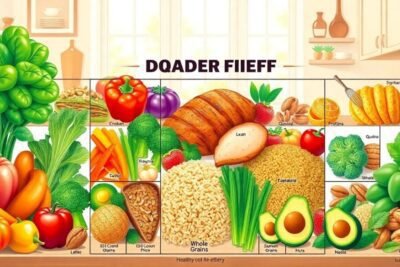
How to lower blood pressure quickly for test
Managing blood pressure can be a critical task, especially when preparing for a medical examination. Understanding how to lower blood pressure quickly for test situations can help you achieve the best possible results. Fortunately, there are various methods to achieve this in a short amount of time.
In this article, we will explore effective strategies for lowering blood pressure fast, including lifestyle changes, dietary adjustments, and emergency tactics.
- How to lower blood pressure fast?
- What are the best lifestyle changes for blood pressure control?
- How to manage blood pressure the day of the exam?
- What foods can help lower blood pressure quickly?
- How to prepare for a DOT physical exam with high blood pressure?
- What are the most effective home remedies to lower blood pressure?
- How to reduce blood pressure immediately in an emergency?
- Related questions about lowering blood pressure
How to lower blood pressure fast?
When it comes to achieving quick results, there are several techniques that can be implemented. One of the most effective methods is through deep breathing exercises. Taking a few moments to breathe deeply can help calm your nervous system, which in turn may lower your blood pressure.
Another way is to ensure you are hydrated. Drinking water can help flush sodium from your system, which can lead to a decrease in blood pressure levels. Aim for at least 16 ounces of water before your test.
- Practice deep breathing meditation for at least five minutes.
- Stay hydrated by drinking plenty of water.
- Avoid caffeine and alcohol for at least 24 hours before your test.
Lastly, consider a quick walk. Engaging in light physical activity can help release tension and improve blood circulation, contributing to lower blood pressure.
What are the best lifestyle changes for blood pressure control?
Long-term management of blood pressure is crucial to overall health. Key lifestyle changes can have a significant impact. A balanced diet rich in fruits, vegetables, and whole grains can help maintain healthy blood pressure levels.
Additionally, regular exercise plays a fundamental role. Engaging in at least 150 minutes of moderate aerobic activity each week can reduce blood pressure by 5 to 8 mm Hg. Weight management is also essential; even a modest weight loss can have significant effects.
- Incorporate more fruits and vegetables into your meals.
- Limit your sodium intake to less than 2,300 mg per day.
- Engage in regular physical activity, such as walking or cycling.
- Reduce alcohol consumption and quit smoking.
Lastly, managing stress through techniques like yoga or mindfulness can also contribute to lower blood pressure.
How to manage blood pressure the day of the exam?
The day of your exam, it's essential to take specific steps to ensure accurate blood pressure readings. Resting for at least five minutes before your test can provide a more accurate measure. Avoid crossing your legs and tense your muscles, as these can artificially elevate your readings.
It's advisable to avoid any stimulants, including caffeine and nicotine, prior to the test. Instead, focus on relaxation techniques to help calm your nerves.
- Take a few deep breaths to calm down.
- Ensure you have a good night’s sleep the day before.
- Eat a healthy breakfast that includes potassium-rich foods.
Incorporating these practices can help ensure that your blood pressure remains within the desired range during your exam.
What foods can help lower blood pressure quickly?
Diet plays a crucial role in managing blood pressure. Certain foods are particularly effective at helping to lower blood pressure quickly. Foods rich in potassium, such as bananas, sweet potatoes, and spinach, can help balance sodium levels in the body.
Beet juice is another great option, as it contains nitrates that can promote vasodilation, ultimately lowering blood pressure.
- Bananas and other potassium-rich fruits.
- Leafy greens such as spinach and kale.
- Beet juice for its vasodilating properties.
- Oats and whole grains for their fiber content.
Incorporating these foods into your diet, especially on the day of your test, can help you achieve better results.
How to prepare for a DOT physical exam with high blood pressure?
Preparing for a DOT physical exam requires careful planning, especially if you have high blood pressure. First, consult with a healthcare professional to determine if your blood pressure is within acceptable limits prior to the exam.
On the day of the exam, drink plenty of fluids to help flush excess sodium from your system, which can aid in lowering your blood pressure.
- Avoid unhealthy foods and sodium-rich snacks in the days leading up to the exam.
- Consume potassium-rich foods like bananas or avocados to help reduce blood pressure.
- Engage in light exercise to relieve stress.
Following these guidelines can enhance your chances of passing the physical exam.
What are the most effective home remedies to lower blood pressure?
Home remedies can be a quick and natural way to lower blood pressure. Regularly consuming garlic, for instance, can have a positive impact due to its natural properties that promote blood vessel dilation.
Other home remedies include drinking hibiscus tea or consuming omega-3 fatty acids found in fish and flaxseeds, both of which support heart health.
- Garlic supplements or raw garlic can be beneficial.
- Hibiscus tea for its antioxidant properties.
- Omega-3 fatty acids from fish or flaxseeds.
Implementing these remedies can aid in maintaining healthy blood pressure levels.
How to reduce blood pressure immediately in an emergency?
In an emergency, quick actions can make a difference. If you find yourself in a situation where your blood pressure is dangerously high, try to find a calm space and practice deep breathing. Inhale slowly through your nose and exhale through your mouth.
Additionally, drinking a glass of water can help, as hydration is key in managing blood pressure spikes. You may also want to place your feet up, as this can help improve blood flow and reduce pressure.
- Find a quiet space to relax and breathe deeply.
- Drink water to help lower sodium levels.
- Elevate your legs to improve circulation.
Implementing these strategies can help you manage sudden spikes in your blood pressure effectively.
How can I lower my blood pressure fast for a test?
To lower your blood pressure quickly for a test, practice deep breathing techniques and ensure hydration. Engage in light physical activity, such as walking, and avoid stimulants like caffeine and nicotine prior to the appointment.
How can I bring my blood pressure down urgently?
For urgent blood pressure reduction, focus on relaxation techniques and hydration. Deep breathing exercises can effectively manage anxiety and temporarily lower blood pressure levels.
What is the 60 second trick to lower blood pressure?
The 60-second trick involves taking a moment for deep, controlled breathing. Inhale deeply for a count of four, hold for four, and exhale for a count of four. This technique can quickly calm your nervous system and reduce blood pressure.
How to get your blood pressure down before a reading?
To prepare for an accurate reading, rest for a few minutes prior to measurement, avoid crossing your legs, and engage in relaxing activities. Avoid caffeine and smoking for at least 30 minutes before the reading.










